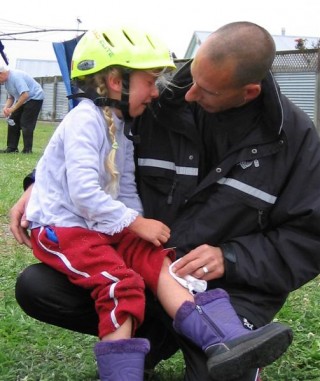Motherless Girls
A growing body of research warns about the effects of fatherlessness on girls: premature sexual experimentation, low self-esteem, and increased risk of eating disorders are amongst them.
But we know nothing about motherless children. Census figures suggest that about 13,000 New Zealand girls—and 16,000 boys— of all ages grow up mainly or only with their fathers.
Harald Breiding-Buss talked to three men about their experiences of raising girls without a mother.
Ellie
If you were to meet 22 year old Joshua* you wouldn’t pick him as a solo dad. Afflicted with Aspberger’s Syndrome, a mild form of autism, he said he’s always been a ‘lone wolf’.
Add to that an appearance that would have most people guessing at well under 20 you’d be forgiven for thinking the boy is yet to enter his first serious relationship.
Josh has been raising daughter Ellie*, now about 20 months old, from when she was just starting to crawl. In fact, when Ellie was born, he was no longer with her mother and, like most fathers in this situation, would expect to have a hard time keeping up a relationship with his baby.
Joshua became a solo dad as a result of serious neglect, having been a non-custodial father at the outset.
All three of the solo dads interviewed for this story have similar stories – for Lee it was drugs, for Allan alcohol, and abuse was a theme in all.
At a time when a major publicity campaign tells men to stop abusing women and children, some men are left picking up the pieces for children abused by their mothers.
No-one knows how much of a role abuse plays in the rates of single fatherhood in New Zealand, or anywhere else in fact. Ken Clearwater from the Male Survivors of Sexual Abuse Trust in Christchurch cites New Zealand research saying that 83% of physical child abuse is committed by women.
Overseas statistics are similar.
Meanwhile, single father rates have been edging up internationally. Here, 18% of all single parents are male, compared to 23% in the US (2000 Census), 20% in Canada (2003), 16% in Germany (2004), 15% in France (2001), 10% in Japan (2000) and 9% in England/Wales (2001), putting us near the top of the list.
While politicians are slowly waking up to ‘fatherlessness’, it is ‘motherlessness’ that is showing an upwards trend. Mother involvement is low for the three girls in this story, although Ellie is starting to see more of her mother, with Joshua’s whole-hearted support.
He also says it is important, “essential” in fact, that any girlfriend of his was able to establish a good relationship with Ellie.
“Ellie and I – it’s a package deal really”, he says about his dating prospects. But he has no intention of finding a new ‘mother’ for her: “She has a mum – I keep it simple. She has the women at childcare for a bit of female input. I’m not worried that she doesn’t get enough of it.”
Samantha
Mother contact is more of an issue for Samantha, 7 year-old daughter of Lee. Lee, 32, has started looking after her fulltime when she was four years old, after he became aware of her mother’s drug use and the environment Samantha was in.
They had all lived together as a family for Sam’s first two years, but then her parents broke up and Lee became an access dad – one week out of four Sam was with him.
There’s no doubt that Sam misses her mum at least sometimes. “What I get now [from Samantha]”, says Lee, “is: why doesn’t mum ring me? When is mum going to see me? And all I can say is there’s nothing I can do about it, it’s all up to you mother.”
Although having been in an on-and-off relationship with another woman for some years (and having had another two children) Lee echoes Joshua’s sentiments as to who should fill the mother role: “Sam’s got a mum and she knows who her mum is.
It’s not like [the mother of my younger children] is her mum. I kept it simple, otherwise you get a lot of questions and she just gets confused.”
Sinead
Sinead, 11 year old daughter of Allan, 39, is very lucky if she gets any time with her mother at all. In the past few years there were no visits, but she got four letters from her mother, in which her mother blames Allan of not letting her see her.
Allan says Sinead’s mother had arranged twice in the last year to see Sinead, but then canceled each time.
Around Christmas times Sinead is missing her mother especially. “She finds it really, really rough. In the last couple of weeks she has said every night that she misses her mother. Birthdays are also hard, because there is no letter, no card.”
Sinead even wants her dad to get a girlfriend so she can have a ‘mother’.
She has been living with dad since she was five, but Allan had been her primary caregiver throughout her baby years as well. He says he relies quite heavily on his mother and sister to provide female role models, and to guide Sinead through puberty issues that she doesn’t feel comfortable talking to dad about.
With Sam getting older Lee, too, thinks there’s some things she feels more comfortable talking to women about, and he reckons he is lucky that he has some women friends.
“She locks up a bit when talking about her feelings ”, he says,”but she’ll talk to my female friends and then they tell me what the problem was. I don’t know if it’s a female thing or if she’s not really sure how I’ll take it.”
But Lee doesn’t think twice when it comes to introducing his girl to his “boy’s toys.” He did give up Speedway, a form of motorcycle racing, when he took care of Samantha because it’s a dangerous sport and he was aware she had nowhere to go if something happened to him.
But that didn’t stop him from introducing her to motorbikes, which she now rides herself with glee.
“Sam’s been riding motorbikes from about 4-5. She went from riding motorbikes to riding pushbikes without trainer wheels. She keeps asking when we can go out to Amberley to go motorbike riding.”
That’s not the only thing that he sees as being different from how mums parent: “I’m not over her all the time. If she falls over or something I’ll try and laugh it off with her. Or say’ you’ll be fine’. I don’t really want to baby her. She’s gotta learn for herself.”.

Father & Child co-editor Mark Stephenson with daughter Gina. Mark shares day-to-day care with Gina's mother.
Josh finds another difference: “I’d say I have more patience than a normal single mother. When [Ellie] has a tantrum I can just ignore her and not get wound up myself about it.”
The biggest thing that Alan has noticed is conversation. “Sinead wakes up in the morning and starts talking and shuts up when she goes to sleep”, he says. “I really have to work to keep a conversation going at my end, but it’s amazing how far you get with ‘yes’ and ‘aha’.”
“Even so he says that sometimes the information overload causes him to “get up and go to my room for 10-15 minutes”.
Other things appear universal problems amongst single parents of either sex. Finding time for yourself ranks high on the wish list for most. Josh finds it particularly hard, with young children being so emotionally demanding.
Allan, too, identifies this as probably the most annoying thing about single parenthood. “I’d like the ability to just get up and go for a walk. I can’t do that.”
For Lee the situation is even more complex. In addition to Samantha he has a 12-year old boy, which he sees every weekend, and two younger children. Coordinating his four children seems to be defining his life.
It’s hard to say what motherlessness is going to do to girls like Ellie, Samantha or Sinead in the long term. “Sinead gets bullied at school”, says Alan.
”Sometimes she gets teased about not having a mother. She has never come across anybody at school who lives with their father.”
He also thinks that she is idealising her mother, “which may cause problems once she is old enough to make her own decisions about going to see her.”
Men like Lee, Josh or Alan are virtually invisible – which means their children are too. They are not getting even a fraction of the attention of social or health services that children from two-parent or solo-mother families get.
This would be more understandable if solo fatherhood was a new phenomenon. However, as far back as 1981 15% of single parents in New Zealand were male, a figure that has only recently increased. Single fatherhood is as old as single parenthood.
Yet we know practically nothing about them. No research on solo fathers has ever been funded by government in New Zealand. A review of Census data by Davey in 1999 may be the only piece of research that has ever been done on solo fathers here.
The Families Commission, which is set up to fund research to inform policy making, has twice turned down proposals for research on solo fathers by the Father & Child Trust.
Looks like as a Society we’re not too interested in children like Ellie, Samantha or Sinead.





